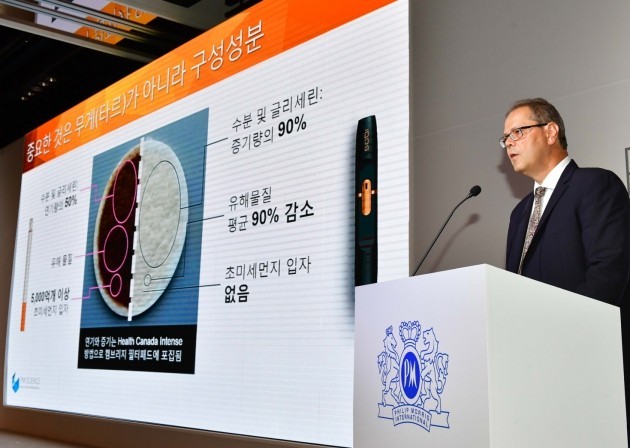Tobacco maker Philip Morris International said Monday that its clinical study proved that switching to its heat-not-burn cigarette device could reduce health risks compared to conventional cigarettes, reigniting controversy over the harmfulness of HNB products.

PMI’s study result comes two weeks after South Korean health authorities released a safety result that found HNB cigarettes -- IQOS by PMI, Glo by British American Tobacco and Lil by KT&G -- to be equally harmful as traditional cigarettes, if not more harmful.
According to PMI, its latest clinical test was conducted on 984 conventional cigarette smokers over the age of 30 in the US. It asked 488 people to switch to IQOS for six months. Eight of their health indexes in the clinical risk assessment related to diseases associated with heart, lung and organ systems positively changed, compared to those who continued smoking conventional cigarettes, the company said.
“The latest research was conducted to demonstrate clinical, biological and functional health changes in smokers switching to the HNB product. The result has proven that the HNB product can reduce the risk of smoking-related diseases,” said Manuel Peitsch, chief scientific officer at PMI.
The study showed that levels of carcinogens such as the Total NNAL index were reduced by 43.5 percent, while levels of FEV1%pred, a ratio used in the diagnosis of obstructive and restrictive lung disease, were also reduced, according to Peitsch.
The company also said health authorities “falsely reported” the result, which could cause misunderstanding among consumers.
The Ministry of Food and Drug Safety earlier said that HNB products produced 4.8 to 9.3 milligrams of tar, while a conventional cigarette produced 0.1 to 9.3 mg, therefore HNB cigarette smokers are exposed to more harmful chemicals.
“The World Health Organization claims that ‘low tar’ or ‘light’ cigarettes can be misleading as studies have shown that they are likely to deliver as many or more poisons and toxins to smokers as regular cigarettes,” said PMI in a statement.
Overseas health institutes including the German Federal Institute for Risk Assessment state that since the levels of tar in tobacco are nothing but the weight of residue, it is unsuitable to compare levels of tar in HNB products and conventional cigarettes.
“The amount of tar should be abandoned as a basis for measurement or regulation, because such comparison may imply that conventional tobaccos are safer,” it said, adding that smokers deserve correct information.
PMI said it would submit its clinical test result to the ministry to ask for health authorities’ explanation.
The ministry told The Korea Herald that the department responsible for the issue will review the case, if necessary.
By Kim Da-sol (ddd@heraldcorp.com)



![[AtoZ into Korean mind] Humor in Korea: Navigating the line between what's funny and not](http://res.heraldm.com/phpwas/restmb_idxmake.php?idx=644&simg=/content/image/2024/04/22/20240422050642_0.jpg&u=)


![[Exclusive] Korean military set to ban iPhones over 'security' concerns](http://res.heraldm.com/phpwas/restmb_idxmake.php?idx=644&simg=/content/image/2024/04/23/20240423050599_0.jpg&u=20240423183955)
![[Herald Interview] Why Toss invited hackers to penetrate its system](http://res.heraldm.com/phpwas/restmb_idxmake.php?idx=644&simg=/content/image/2024/04/22/20240422050569_0.jpg&u=20240422150649)
![[Graphic News] 77% of young Koreans still financially dependent](http://res.heraldm.com/phpwas/restmb_idxmake.php?idx=644&simg=/content/image/2024/04/22/20240422050762_0.gif&u=)







![[Exclusive] Korean military to ban iPhones over security issues](http://res.heraldm.com/phpwas/restmb_idxmake.php?idx=652&simg=/content/image/2024/04/23/20240423050599_0.jpg&u=20240423183955)



![[Today’s K-pop] Ateez confirms US tour details](http://res.heraldm.com/phpwas/restmb_idxmake.php?idx=642&simg=/content/image/2024/04/23/20240423050700_0.jpg&u=)